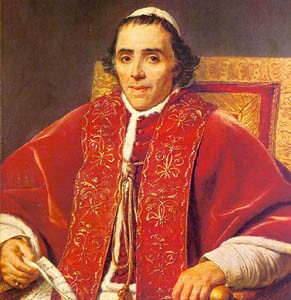 When Pius VI died a prisoner in France, there were those who sneered that
Pius VI would be Pius the Last. But the cardinals got together at Venice
and elected another and great Pius in the person of Barnaba Chiaramonti,
who took the name Pius VII.
When Pius VI died a prisoner in France, there were those who sneered that
Pius VI would be Pius the Last. But the cardinals got together at Venice
and elected another and great Pius in the person of Barnaba Chiaramonti,
who took the name Pius VII.
Barnaba Chiaramonti was born at Cesena, August 14, 1740, of noble parents.
At the age of sixteen Barnaba entered a Benedictine monastery and took the
name Gregorio. He became abbot of San Callisto in Rome, but Pius VI took
him from the monastery to make him bishop of Tivoli, then bishop of Imola,
and in 1785 a cardinal. When the French overran Imola in 1797, Cardinal
Chiaramonti earned the admiration of Napoleon by sticking to his post. By
interceding with Generals Augereau and Macdonald, he saved his flock from
misery; and in a Christmas address he said: "The democratic form of
government is not . . . repugnant to the Gospel. On the contrary it exacts
all the sublime virtues which are learned only in the school of Jesus
Christ." These words, now commonplace, took vision and courage to utter in
1797 with the smell of blood still rank on French "democracy."
Pius VII had the great joy of restoring religion in France. After difficult
negotiations a concordat was signed in 1801 between the Holy See and the
French Republic. Pius had the gift of choosing and trusting capable
assistants, and it was one of these, the outstanding diplomat Cardinal
Consalvi, who went to Paris and pulled the concordat through tight places.
In spite of the fact that Napoleon played the weasel with his "organic
articles," the concordat was a great blessing. No wonder Pius VII took the
extraordinary step of going to Paris for Napoleon's coronation in 1804.
Napoleon, however, soon gave the Pope plenty of trouble. He kept insisting
that Pius take sides in the war against England. Bitterly disappointed at
the Pope's neutrality, he finally seized the Papal States in 1809. When
Pius boldly excommunicated him, Napoleon had the Pope carried off a
prisoner to France. In 1813 Napoleon first isolated Pius from his trusted
advisers and then bullied him into making concessions which the Pope
bitterly regretted. It was not long before Pius withdrew these, and not
long either before Napoleon, with his empire collapsing, freed the Pope. By
May 27, 1814, Pius was back in Rome.
Two events show the prestige and independence Pius had gained for the
papacy. On August 7,1814, Pius VII restored the Society of Jesus throughout
the world. The second act was in the temporal sphere. Cardinal Consalvi
represented the Pope at the Congress of Vienna, and from that assembly of
the Powers he brought back the entire Papal States to Pius VII. Only the
outside territories like Avignon in France and Benevento in Naples were
excepted.
A third act shows why Pius deserved so much prestige. A true Vicar of
Christ, he sheltered the broken family of Napoleon, and he even interceded
with the British to soften the lot of his old persecutor on St. Helena.
When Pius VII died on August 20, 1823, Gallicanism and Jansenism were
becoming historical memories. It is true that infidelity still threatened,
but many intellectuals were now reading Christian apologists like
Chateaubriand and Lammenais rather than Voltaire and Rousseau.
Excerpted from "Popes
Through the Ages" by Joseph Brusher, S.J.

